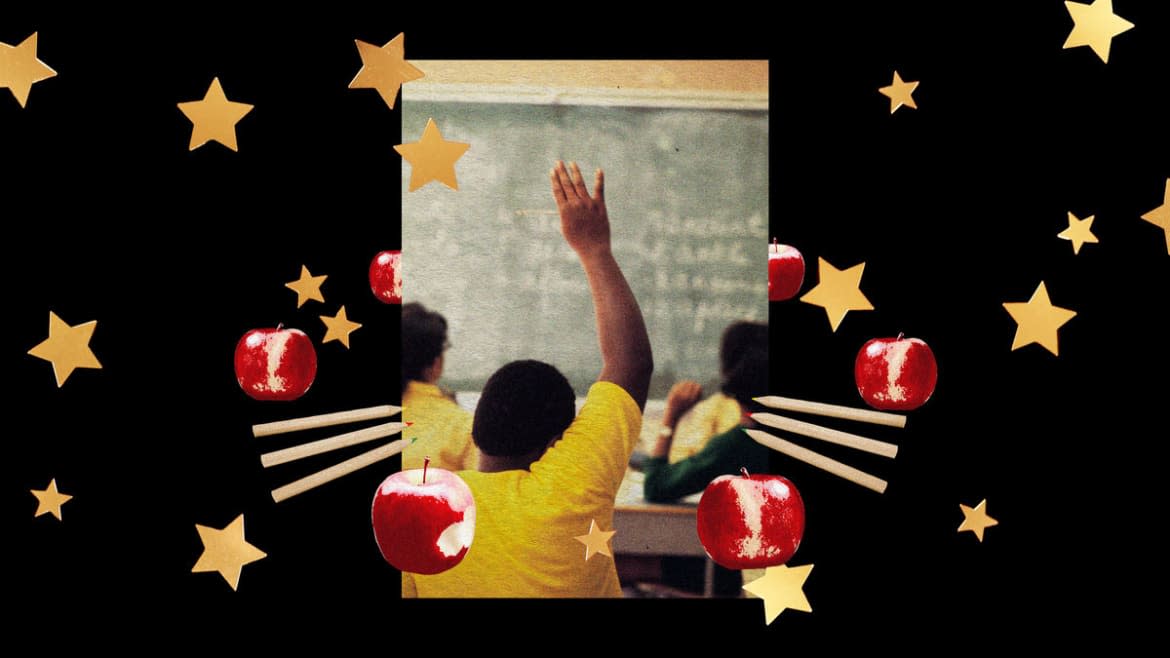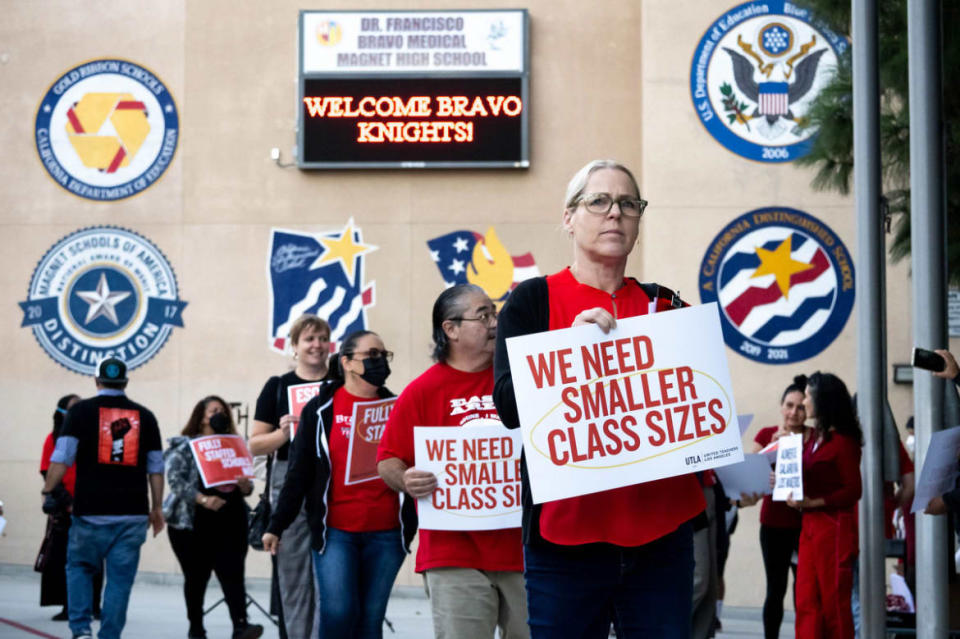Kids Do Better In Schools With Teachers Unions

- Oops!Something went wrong.Please try again later.
- Oops!Something went wrong.Please try again later.
You know what’s about to be served up when the first two words of an opinion piece criticizing teachers and their unions are “Derek Chauvin,” the police officer who murdered George Floyd.
In “The Liberal Case Against Public Unions,” Philip K. Howard deploys a barrage of empty right-wing rhetoric to claim unions use “brutal” tactics to achieve their “demands” and that they "enforce a culture of entitlement” in which “employees are ostracized if they strive to do more than a bare minimum.” Tell that to teachers as they arrive at school early to give students extra help or head to their second job after the school day ends.
Allow me to make instead a factual case for teachers’ unions, from empowering teachers’ professionalism to their association with higher student achievement, to their creation of a more just and fair society.
The Liberal Case Against Public Unions
Research shows that teachers unions are positively associated with student achievement. Researchers Eunice Han and Jeffrey Keefe found that this effect is particularly strong for Hispanic and Black students. And economists Eric Brunner, Joshua Hyman, and Andrew Ju have found that districts with strong teachers unions increased spending on public education, which leads to larger increases in student achievement.
Howard claims that unions get officials elected so they can demand a “pay-off” at the bargaining table. Really? Try walking in our shoes for a few days. The “pay-off” my union bargains for is to improve teaching and learning conditions and to reduce the “teacher pay penalty”—the gap between teachers’ compensation and their non-teacher college-educated counterparts that hit a high of 23.5 percent in 2021.
Teaching has always been a complex and demanding job. After the onset of the pandemic, teachers worked harder than ever. They managed remote, hybrid, and in-person instruction. They covered classes for colleagues suffering from COVID, often for weeks. They helped students recover academically, socially, and emotionally.

UTLA teachers protest outside Bravo Medical Magnet High School in Los Angeles Wednesday, October 19, 2022.
Yet Howard and other critics blame disruptions to learning on teachers and their unions—not a deadly pandemic that has killed 1 million Americans and left more than 200,000 kids orphaned. The critics don’t blame unequal access to technology, or economic and social inequity, nor the last president’s chaotic response to the virus, nor the officials who failed to upgrade ventilation and enact other health and safety measures in schools.
Even before the pandemic, nearly 300,000 teachers were leaving the profession each year. The pandemic, political culture wars, and unending gun violence have made this era the toughest in modern times. Teachers are twice as likely to face job-related stress compared to other working adults. Amid a dire and growing teacher shortage, it’s significant that teacher unions have a beneficial effect on teacher support and retention.
The rights we possess as citizens in a democracy don’t have to disappear when we enter the workplace. Take due process. In education, it is the simple idea that a teacher should not be dismissed or disciplined without a good reason that pertains to the work they do as a teacher. Without due process, employees can be fired at any time for any reason or no reason at all.
Teachers Unions Need to Adapt, Just Like the Rest of Us
The problem is not that educators have too many rights. More often, it’s that teachers have too little support and trust to do their best for their students. It’s being required to teach lockstep to a pacing calendar, even if students need more time. It’s getting in trouble for allowing students to continue a debate over two days instead of one. And, too often, it’s not being heard, or even asked, about decisions that affect teaching and learning. As labor lawyer Richard Casagrande has said, tenure laws are not a “gift to teachers. These laws empower teachers to teach well.”
It is worth noting that teachers earn tenure by demonstrating competence over a period of up to three years or longer. I have forcefully and consistently argued that tenure is a guarantee of fairness and due process, not an excuse for managers not to manage, not a cloak for incompetence and not a job for life. If someone cannot teach, after they have been prepared and supported, they should not be in our profession. Due process provides a fair and efficient procedure for this.
Unions do far more than protect workers from arbitrary or unjust treatment. In addition to fighting for educators to be paid in accordance with the important work they do, my union also fights for what students, their families, and their communities need. The Detroit Federation of Teachers recently negotiated a home visit program to combat low student attendance. The Boston Teachers Union’s contract includes $100,000 each year to support students experiencing homelessness. Many of our local unions are fighting for the conditions to support the social and emotional health of students, including the creation and expansion of community schools.
Here’s Why a Court Struck Down Florida’s Dystopian ‘Stop WOKE Act’
Meanwhile, the culture wars incited by politicians trying to further their careers show no signs of abating. Extremists have made disgusting claims that teachers are grooming and indoctrinating students. Florida Gov. Ron DeSantis has burnished his far-right credentials by pushing legislation like the so-called “Don’t Say Gay” law and the “Stop WOKE Act.”
Virginia Gov. Glenn Youngkin’s first act in office was to sign an executive order to root out critical race theory from the state’s education system even though it wasn’t taught; he even started a tipline for parents to report teachers. Many teachers are scared to allow discussions of complex topics that help prepare students for a healthy democracy. History teachers worry whether they can teach slavery, reconstruction, or civil rights. Add all this to the case for teachers’ right to a union.
Perhaps the simplest and strongest argument for unions and collective action is that together we can accomplish things that would be impossible on our own. Individuals can be powerless to effect change, but working together has a multiplying effect that can tilt the balance of power. Make no mistake: That is what many people with political and economic power are afraid of. And that is why workers’ rights to belong to a union are under unceasing assault.
Get the Daily Beast's biggest scoops and scandals delivered right to your inbox. Sign up now.
Stay informed and gain unlimited access to the Daily Beast's unmatched reporting. Subscribe now.

